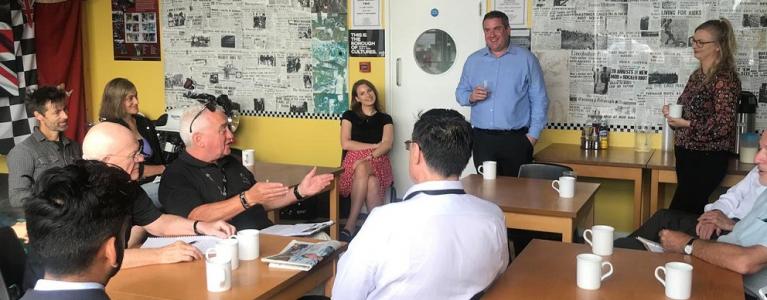
Community Conversations are open to everyone to discuss topics of interest raised by the community. At our most recent Community Conversation, we were lucky enough to be hosted by the Ace Cafe, a place to hangout for motoring enthusiasts as well as local people.
The second event in our Community Conversation series, it was great to see so many familiar faces and meet some new people too. We ask community members to nominate discussions topics in advance, this time the subject chosen was Planning Enforcement. For this reason, Acting Head of Development Management, Ben Martin and Senior Planning Officer, Laura White were there to lead the conversation.
The pair started by outlining the role OPDC plays in planning enforcement within its boundary.
OPDC is the local planning authority for the area and therefore has responsibility for planning enforcement matters. In general, this means that OPDC can take enforcement action against building developments which do not have planning permission or those who change the use of buildings without planning permission.
Whilst OPDC has a range of powers to enforce against breaches of planning control, OPDC does not have powers to tackle environmental issues. These include fly-tipping, highway matters, noise and disturbance, licensing or health and safety breaches. Instead these matters should normally be referred to the local councils - Brent, Ealing, Hammersmith & Fulham.
Having presented this, people then asked questions about OPDC’s power to act when it comes to untidy land when the condition of this land may have a harmful effect on the area. If private land becomes untidy to an unacceptable degree the local planning authority, in this case OPDC, can issue an untidy land notice (Section 215 notice) to the owners of the land when appropriate. Before this happens, an assessment would be made to establish the level of harm and whether it would be expedient to take formal action.
Other topics of conversation included whether OPDC had the powers to enforce against developments such as shisha bars. OPDC have powers to enforce against unauthorised changes of use, which could include unauthorised shisha bars. However, each case would be subject to a full investigation and an assessment as to the best course of action depending on the circumstance. This action may be through negotiation with the land owners, the submission of a retrospective planning application or, if appropriate, formal enforcement.
The OPDC planners, Ben and Laura, then shared with the group their progress towards creating an Enforcement Plan for Old Oak and Park Royal. The Enforcement Plan outlines the planning enforcement process, what OPDC’s priorities are when it comes to taking enforcement action and more importantly informs residents and businesses of what they can expect from OPDC should a breach of planning control occur. The Old Oak and Park Royal Enforcement Plan will be consulted on from 28 October to 8 December 2019, during this time the public will be able to feedback on the plan before it is formally adopted.
Following general Q&As, tea and coffee was available for those who wanted to stay and continue the conversation, mingle and discuss wider OPDC matters.
Community Conversations are a fantastic opportunity to ask questions with experts from the OPDC team and partner organisations there to share insights. They’re designed to provide updates on our plans, discuss key topics and listen to local people. We hope to see you at the next one.